
Bentonville Superintendent Dr. Debbie Jones displays some of the many, many vaping devices the school has confiscated from Bentonville West High students. Schools are taking steps to curb vaping while waiting for lawmakers and regulators to act.


Bentonville Superintendent Dr. Debbie Jones displays some of the many, many vaping devices the school has confiscated from Bentonville West High students. Schools are taking steps to curb vaping while waiting for lawmakers and regulators to act.
Here’s a hint: It’s not about wealth or fame
Webster’s Dictionary defines success as a favorable or desired outcome, or the attainment of wealth and favor. I venture to guess that most people measure success based on their wealth, fame or public standing in the community.
My personal opinion is that success is measured by the positive impact that we have on others around us. Personally, for me to feel like I have succeeded in life, I want to leave this earth a better place than it was before I entered. I want my family and community to know that I tried my best.
ASBA and its membership are teeming with people whose prime concern is developing our young people into being successful individuals. The same can be said for my local school board and many others across the state. We want all of our students to be active in their communities, make a lasting and positive impact and do whatever career they have chosen to the best of their ability.
A successful outcome and positive impact are what often leaves me in awe of teachers and school staff. Students and parents rarely if ever acknowledge the impact teachers have had on their


by Neal Pendergrass ASBA President
lives. Teachers and school staff just keep doing what needs to be done, educating and caring about their students and helping them strive for success.
Our school always presents a program for the students about Veterans Day. If anyone has ever been successful, it is certainly the veterans in our communities. They put their own lives and families on the line to protect the freedoms we all enjoy. This is a huge positive impact and the very definition of success.
Movie stars, professional athletes and other famous people are often idolized and seen as successful in today’s world. Many of them, even though they have fame and millions of dollars, still struggle with habitual drug use and
other problems. Success as measured by society has not brought them personal success. Yes, high GPA and SAT scores are important, but the most important thing that board members and school staff can do is allow students to become successful and productive members of their community.
On a personal note, this is the last column I will write as ASBA president. It has been a privilege to serve in this office, and it was a wonderful opportunity for me that has made me proud to serve as a school board member. I have had the opportunity to represent ASBA at the Southern Region conference in New Orleans and at the NSBA meeting in Chicago. I have had the chance to meet school board members from all over the United States. Most are fighting the same battles that we are here in Arkansas. Remember that we are not an island! Help is just around the peninsula, so to speak.
I want to congratulate Randy Goodnight as he begins his term as president. I leave my position knowing it is in good hands. I hope to see you in Hot Springs this summer as Arkansas hosts the Southern Region Conference. On that note I say thank you for your help and support this year.

Control from foundation to poletop. . . from the light source to the field, preserving the night sky. . . assuring the results you expect, day 1. . . year 1 . . . and for 25 years.






20 Mountain View Superintendent Brent Howard, right, and Mountain View School District Police Chief Keenan Glenn are cracking down on vaping in the district by installing detectors in bathrooms and issuing citations to users. One student recently was ordered to complete eight hours of community service by a juvenile court.
Legislators will meet again in the 2020 fiscal session and the 2021 regular session, and ASBA was already soliciting ideas for its legislative agenda at its regional meetings this fall.
In basketball, the point guard distributes the ball so others can excel, so it’s not surprising that next year’s Arkansas Teacher of the Year played that position in high school not very many years ago. “I view each class as its own little team,” said Joel Lookadoo, 29, of the Springdale School District.
In special elections Sept. 10, Prescott, West Memphis, Foreman and Dierks passed millage increases. Meanwhile, other requests elsewhere failed – one of them by one vote. 20 Cover / How can schools stop vaping?
“We’re losing this fight within the schools. And guys, this is not kids of poverty. This is all kids, it’s very popular, and we have lost control in trying to discipline this out of the schools.” That’s what Dr. Debbie Jones, Bentonville superintendent, told legislators Sept. 9 after seeing vaping reach what she called “epidemic proportions within the schools.”







by Dr. Tony Prothro
The season of fall holidays is here again. I always enjoy this time of year with the extended foliage colors and mild temperatures. It also is a time when I reminisce over the past year’s activities and happenings. The fall brings about many changes. We see some of our past experiences and circumstances fade in the distance with the change in the season. I honestly experience a little nostalgia with the passing of the fun summer activities and events.
However, the fall also affords new opportunities to experience. The changing of the colors are a welcome sight to many individuals, and Christmas and the New Year’s holidays are fast approaching. Those holidays are a time when I see many family members I haven’t seen in the past year. It is also a season to have extended time with some of my favorite people – my children and grandchildren!
I don’t desire to sound overly empathetic or exceedingly emotional, but I am so very thankful for all the undeserved blessings I have been given to celebrate during this time of year. As I grow older (and hopefully more mature), I am also cognizant of the world and, more specifically, the people around me. Being a career educator, I am especially mindful of our school-age children. If you look closely at the faces in your schools, you may find that many do not have much cause for celebration. Children are faced with overwhelming obstacles, discomforts and sometimes acute pain in their lives. Most of those obstacles are due to circumstances outside their control or someone else’s decision-making process. It is very hard
for a hungry, neglected, ignored, or abused child to master the curriculum we are required to teach in our schools.
This edition of the Report Card is due to circulate right before the December and January holidays. I encourage board members, administrators, and teachers to take up the charge to meet the needs of the children in our schools in the upcoming year. Ask your administrators and teachers how we as individuals can rise to the challenge of serving this next generation. Next, use your governing power as a school board to assure that the needs of children are being met at school. Contact your legislators about needed services that are lacking or need to be improved. I truly believe legislators care about the well-being of our children. Many are understandably confused by conflicting data and need practical insight. Be prepared to give true anecdotal stories of the needs of your students, or better yet, ask your legislators to visit your schools to gain insight into the issues and needs of our children. There are usually no easy answers or solutions, but I have been reminded that nothing truly worthwhile comes easy.
You have all heard the starfish story where the little boy is told that his throwing starfish back into the ocean would not make a difference with so many lying on the beach. To this the little boy replied, “It makes a difference to this one” as he threw a starfish into the ocean.
Let’s go to work together and find the solutions to save an ocean of starfish –or better yet – the dreams of the next generation.
The Journal of The arkansas school Boards associaTion
Vol. 12, Number 4 December 2019
P.O. Box 165460 / Little Rock, AR 72216
Telephone: 501-372-1415 / 800-482-1212
Fax: 501-375-2454
E-mail: arsba@arsba.org / www.arsba.org
President: Neal Pendergrass, Mountain Home
President-elect: Randy Goodnight, Greenbrier
Vice President: Rosa Bowman, Ashdown
Sec.-Treasurer: Dr. Tad Margolis, Valley View
Past President: Debbie Ugbade, Hot Springs
Region 1: Randy Hutchinson, Springdale
Region 2: Randy Rogers, Lead Hill
Region 3: Dr. Julea Garner, Highland
Region 4: Kyle Cannon, Mena
Region 5: Clint Hull, Pottsville
Region 6: Nikki King, Pangburn
Region 7: D’James Rogers, West Memphis
Region 8: André Acklin, Conway
Region 9: Joey Astin, Forrest City
Region 10: Mark Curry, Lake Hamilton
Region 11:Jeff Lisenbey, Sheridan
Region 12: Willie Buck, Hope
Region 13: Mike Waters, Magnolia
Region 14: Jerry Daniels, Warren
Staff
Executive Director: Dr. Tony Prothro
Board Development Director: Dr. Anne Butcher
Governmental Relations Director: Dan Jordan
Finance Director: Deborah Newell, Diana
Woodward
Staff Attorney: Kristen Garner
Policy Director: Lucas Harder
Database Administrator: Kathy Ivy
Commercial Affiliates/Board Liaison Manager: Angela Ellis
TIPS-TAPS Project Manager: Mickey McFatridge
General Counsel: Jay Bequette
Administrative Assistant/Receptionist: Joyce Brown
Risk Management Program & Workers’ Comp. Program: Shannon Moore, Director
Krista Glover
Dwayne McAnally
Misty Thompson
Amanda Blair
Ashley Samuels Jackson
Jennifer Shook
Melody Tipton
Tiffany Malone
LaVerne Witherspoon
Linda Collins
TO CONTACT THE MAGAZINE
Please contact Steve Brawner, Editor
501.847.7743 brawnersteve@mac.com
Report Card is published quarterly by the Arkansas School Boards Association. Copyright 2019 by the Arkansas School Boards Association and Steve Brawner Communications. All rights reserved.
Nikki King of the Pangburn School District and Jerry Daniels of the Warren School District were elected to ASBA’s Board of Directors at regional meetings this fall.
Haylee. She said that when she’s needed and has an opportunity, one of her favorite things to do is volunteer to spend time with teenagers, doing whatever it takes to help them succeed.
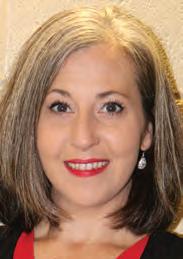
King will serve as Region 6 director, replacing Keith Baker of the Riverview School District. King has served at Pangburn since she was elected in 2013. She is selfemployed, giving her more time to spend with her husband, Derick, and her teenaged daughter,
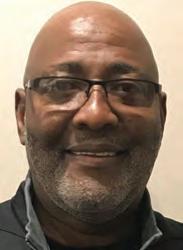
Jerry Daniels was chosen by ASBA Region 14 members to fill the position previously held by Katie Daniel of McGehee. He has served as a board member in the Warren School District since 1993 and is currently the board president there. He is a former volunteer basketball and football coach. He said as the ASBA representative for Region 14, he’ll continue to show his love and support by advocating for the children of his region and the state.
ASBA News and notes continued on next page

• School board legal liability insurance
• Employment practices liability insurance
• Outside of Arkansas General Liability coverage
• Distinctive and identifiable coverage grants
• Modified “defense outside of the limits” provision
• Separate crisis management fund
• Employment law resources through Enquiron
• Online resource website
• Panel defense counsel
• Dedicated claim representative
Once again, ASBA’s School Law Seminar will give school board members, superintendents and school attorneys a chance to hear presentations on significant school law issues in Arkansas.
The seminar will be Feb. 13 at the Wyndham Riverfront in North Little Rock. Check-in and continental breakfast begin at 7:45 a.m. The seminar starts at 8:30 a.m. and ends at 3:30 p.m. Lunch is included.
School board members will earn six hours of boardsmanship training credit for attending.
Registration information for the seminar will be posted on ASBA’s website, www.arsba.org, in mid- to lateDecember.
Anyone with questions can contact Dr. Anne Butcher at abutcher@arsba. org.

Dec. 11-13
Annual Conference Marriott Hotel & Statehouse Convention Center Little Rock
Feb. 13
School Law Seminar
Wyndham Riverfront North Little Rock
April 4-6
NSBA Annual Conference 2020 Chicago
April 20
New Board Member Institute & Workshop for Administrative Professionals Hot Springs Convention Center Hot Springs
May 5 AAEA & ASBA Joint Leadership Conference Embassy Suites Little Rock

Anh Cao, a Bentonville High School senior, won the 2nd ASBA Student Essay/ Speaking Contest.

She was participating in a debate contest in Germany when she learned by email that she had won the award.
Aisha Faiq, a senior at Arkadelphia High School, placed second in the contest. She earned $750 and was scheduled to speak at the Annual Conference at 9:10 a.m. Dec. 13.

The third place winner, Ryan Taneja, a senior at Benton High School, received $500 and was scheduled to speak at 8:30 a.m. Dec. 13.
Harris Rana, a junior at Fort Smith Southside High School, received the honorable mention award and $250.
The contest has two purposes. First, it is designed to give juniors and seniors an opportunity to express creative ideas and concepts, conduct research, think critically, practice public speaking skills, and subsequently receive recognition for doing so. Second, it’s an opportunity for Annual Conference attendees to see and hear examples of the quality of young men and women that Arkansas’ public schools are producing.
In her written remarks, Cao said, “Trust is a prerequisite to accessing the benefits of the other values; without trust, kindness is simply preemptive manipulation. Empathy is empty pity. Honesty is something that must be proven, not assumed. A lack of trust breeds cynicism; a world without it is one where we fail to fulfill our burden to live righteously and act with empathy, kindness, and honesty.”
479.455.5577 modusstudio.com contact@modusstudio.com
Students submitted an essay and a videorecorded speech on the topic, “Is trust the most valuable currency in society?” The essay served as a script for the speech. Cao won $1,000 and was scheduled to present her address at the ASBA Annual Conference Awards Luncheon at 12:15 p.m. Dec. 12.
She concluded her remarks by saying, “Trust is the foundation of every value we cherish; a world that is jaded and distrusting is one where we accept superficial relationships, imprudent politics, and suspect motives for everyday acts of kindness. At the beginning of this speech, I asked you, ‘What is right?’ Now it is time to ask, ‘What is left?’ Trust – without which we as a society are incapable of relying on one another, sharing common ground, or creating a better future.”

In special elections Sept. 10, some districts passed millage increases while other requests failed – one of them by one vote.
In West Memphis, patrons voted 1,806-330 for a 7.5-mill increase that will raise $32.7 million to replace the district’s West Junior High, built in 1948, and Wonder Junior High, built in 1964. The project will reduce the district’s number of junior highs from three to two. It comes at the tail end of the district’s 10-year master facilities plan. Before the increase’s passage, West Memphis had the state’s third lowest millage rate at 29 mills.
The district had two factors working in its favor. One was that it had been awarded $22.4 million from the state’s Academic Facilities Partnership Program. That money was conditioned on
the district raising its own funds within 18 months, so a use-it-or-lose-it argument was “essentially the anchor point of our whole strategy,” said Superintendent Jon Collins.
The district’s other advantage was that it had not asked for a millage increase since 1953. Because the voting age then was 21, a patron would have to be 87 years old to have voted in that election.
“We couldn’t find one single person that remembered casting a ballot in the last election in 1953,” Collins said. Collins said the effort was a grassroots affair led by the district. School officials spoke to community groups, churches, small groups and individuals. Some patrons had to be educated on basic aspects of finance, including that the millage would go entirely to schools.
The effort enjoyed widespread support from community groups, the Chamber of Commerce and elected officials.
“There really just wasn’t much opposition to it at all,” he said. “I think everybody kind of understood the points we were trying to make and the place that we were trying to take our district to, facility-wise, for our children.”
In Prescott, voters by a count of 439-308 approved a 5.9mill increase to build a new elementary school to replace the current 60-year-old facility and make security improvements. It will have bullet-resistant glass and single access entry. The increase also will allow single access entries at the high school and junior highs and will pay for cameras placed throughout the district. The total cost of the project is $11 million, paid for in part through almost $5.2 million in state partnership funds. Passage raised the district’s millage to 41 mills.
The election came five months after a 14-year-old student shot another 14-year-old with a concealed handgun at Prescott High School. The victim recovered, and both students are no longer associated with the district.
The request was trailing after early and absentee voting, 211-214, but it easily won the Election Day vote, 228-94. A big factor was the polling place’s location: at the high school. Superintendent Robert Poole said district officials strongly encouraged teachers, staff and their families to support the millage, and many turned out that day.
A political consultant, NWA Brand, assisted in the campaign.
“To be honest with you, we needed all the help we could get,” Poole said. “And we knew this was going to be a tough time, and they had experience in recently passing one for a school district, and so we just tried to get them on board. Hey, if we’re going to do this, we’re going to go all out, and we’re not going to hold anything back.”
The largest successful millage request occurred in Foreman, where patrons voted 385-140 for an 8.5-mill debt service

millage increase to build a new high school and to extend the existing 7.5-mill debt service millage 12 years to 2049. The election came on the same day that county voters also approved a tax increase for a county jail.
Elsewhere, voters in the Dierks School District voted 139-57 to extend 11 debt mills through 2049 to construct an elementary classroom addition and make other improvements. Passage will enable the district to cease having elementary classes in modular buildings. Superintendent Jody Cowart said supporters emphasized the safety aspect of getting all the students under one roof, as well as energy efficiency, efficiency of management, and reducing transition time for students.
Millage requests failed elsewhere. The toughest loss occurred in Magazine, where a request for a 4-mill increase to 43 mills and also for a bond refinancing failed by one vote, 96-95. The money raised by the bond refinancing would have paid for security enhancements such as single access entries and bullet-resistant glass. Superintendent Beth Shumate told patrons that the millage increase would help the district comply with almost $134,000 in annual unfunded state mandates.
Shumate said many patrons told her after the election that they expected the request to pass and didn’t vote. The district eventually will make another request, but first it will cut expenses.
“Until we can say we’ve done our part to make sure we’re efficient, then it’s hard to ask people to give their money,” she said.
Elsewhere, the Harmony Grove School District in Saline County is taking an “If at first you don’t succeed” approach in its effort to increase its current 41.8 mills to build a 35,000-square-foot addition to the high school. That project will include nine classrooms, science labs, a media center, and band and choir halls.
After its millage request of 3.8 mills to raise $6.5 million failed, 172-188, the district quickly scheduled another election for Jan. 14. This time, the request is 2.8 mills for the same project.
Superintendent Heath Bennett said the district decided to make the second request so quickly for several reasons. First, it has $2.56 million in state partnership funds available for the project. Second, it learned it could build the same addition for 1 mill less by combining bond payments and because of lower interest rates. There was no outspoken opposition; people just didn’t bother to vote in an election where turnout was only 12%. Some people have recently moved to the district and had not changed their registration in time to vote; the district is informing people that they must register by Dec. 16.
In Clarksville, voters said no to a 5-mill increase to raise $11.7 million for a new basketball arena, football stadium improvements and three safe rooms. The vote was 434-1,247.
The request had two high hurdles to overcome. One was its focus on athletics, which Superintendent David Hopkins said was the result of the district’s emphasis on academic facilities in recent years. There just hasn’t been money left for needed sports facilities. Clarksville’s gym was built in the 1970s
when it was a 2A school. It’s now a 5A school. The school board requested the millage increase to replace that gym and make improvements to the football field, where a light pole this spring fell and broke a soccer referee’s leg. After the board had already decided on the request, a tornado threatened the community, but the district had safe rooms at only two campuses. Some patrons were saying they wouldn’t vote for a basketball gym if safe rooms weren’t added, so the school board amended the request.
The other high hurdle was the request’s proximity to a previous election in 2016, when patrons passed a 4.8-mill increase to build a new high school. The school board was torn about asking for another increase, but members knew the improvements were needed.
Hopkins said the board has no plans to make another request unless community members approach it. The millage passed three years ago thanks to volunteers who organized and worked hard.
“This time, that didn’t happen, and we were trying to reach out to those people that helped last time,” Hopkins said. “And they were for it, they supported what we were trying to do, but they were like, ‘Look, we’re just tired and we just don’t want to put our neck out on this.’”
Earlier on Aug. 13, voters in Highland rejected a request to extend the district’s current 5 debt service mills and add another 4 debt service mills through 2049. The millage increase would have raised about $17.465 million to construct a new performing arts center, construct a new roof on the elementary school and replace its windows, add security measures and make other improvements.
The request’s failure leaves Highland with the state’s third lowest millage rate at 30 mills, ahead of only Mountain View and Lee County. Moreover, five mills are scheduled to retire in 2022-23, at which point the district will have the
bare legal minimum and the state’s lowest rate.
Superintendent Don Sharp said a post-election survey found some of the opposition was based on typical anti-tax sentiment, while others were opposed to the performing arts center and others simply didn’t feel well informed. Voters approved a sales tax to build a jail two years ago, which was fresh on their minds. Sharp said school officials determined that having the election during the summer – in fact, on the first day of school – may not have been the best time. The district is located in a rural community where jobs are not plentiful and more than 70% of the students qualify for free and reduced lunch prices.
Sharp said the district will make another request in 2020. This year’s effort was led by school officials. The district will try harder to involve community leaders and is considering using a privately funded professional campaigning firm.

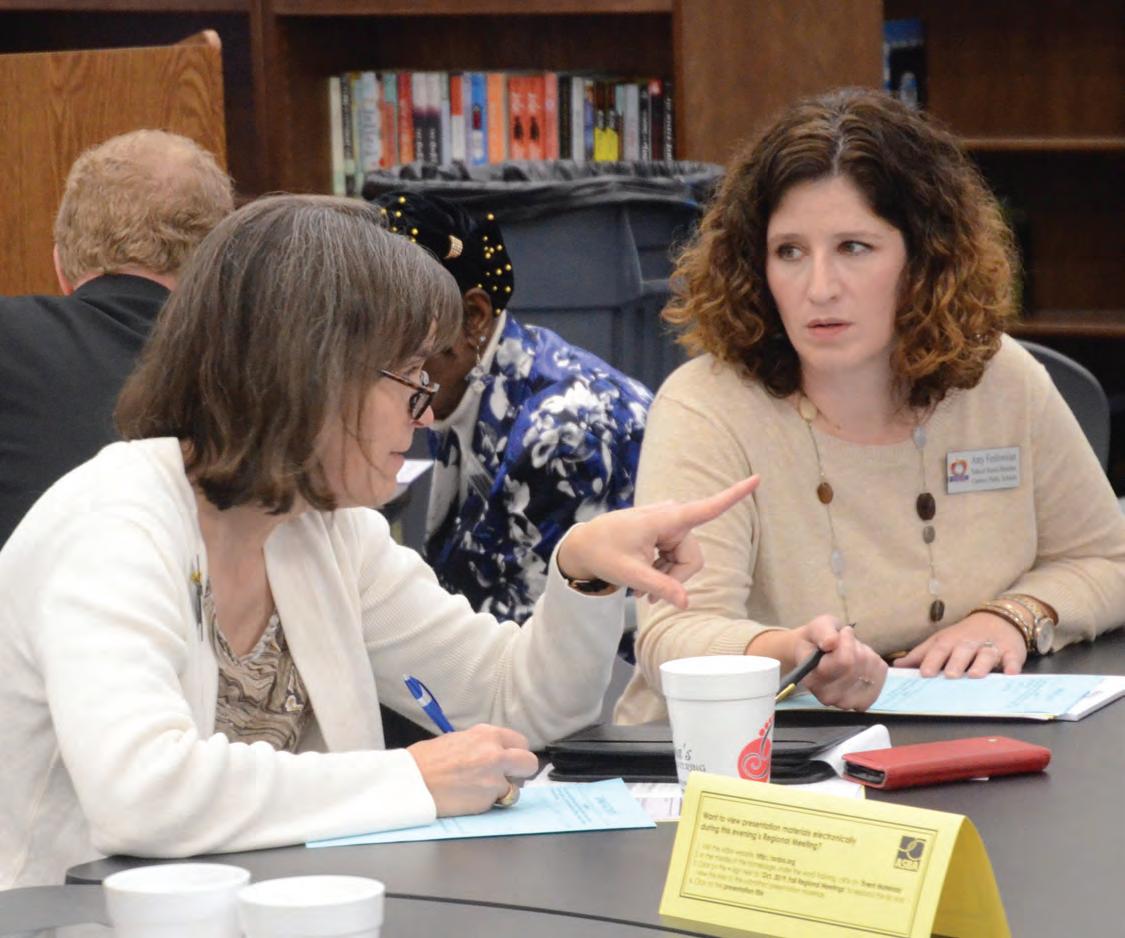
Legislators will meet again in the 2020 fiscal session and the 2021 regular session, and ASBA was already soliciting ideas for its legislative agenda at its regional meetings this fall.
At the Region 8 meeting in Bryant Oct. 22, legislators heard from Conway School Board member Dr. Diane Robinson, who spoke for other participants at her table in saying they’d like to see an end to unfunded mandates and a reversal of a recent reduction in catastrophic spe-
cial education funding. After listing half a dozen changes her table would like to see, she jokingly asked ASBA Governmental Relations Director Dan Jordan, “So, would you fix all that?”
Jordan can’t fix all of that. But he and other ASBA advocates can use what they learned from the meetings to propose bills, support bills proposed by others, and oppose other legislation. Jordan said ASBA tracked almost 200 bills this year that dealt directly with education. ASBA successfully proposed new legislation requiring school board members to receive audit training as part of their first nine hours of professional
development, limiting the ability of sex offenders to attend ticketed school events, and reassuring mandated reporters of their immunity from criminal and civil penalties.
Jordan said more than 600 people registered to attend the meetings. The most common concerns expressed were related to funding. This year, Act 667, the school funding bill, increased per pupil foundation funding from $6,781 in fiscal year 2019 to $6,889 in 2020 and $7,081 in 2021. Those 1.74% and 1.72% increases, respectively, were an improvement over the previous four years, when the increases had hovered
around 1%. But they were less than the 2% increases of the previous six years. Some attendees expressed concern about whether the state will provide funding for teacher salary raises made necessary by Act 170, the Teacher Salary Enhancement Act. It raised beginning teacher salaries to $32,800 in 2019-20 for new teachers with a bachelor’s degree. Meanwhile, legislators passed Act 877 to provide $60 million to help districts whose salary schedules fall below the new minimum salaries over the next four years. But what happens when those four years have ended?
Meanwhile, several attendees indi
Education Committees voted Nov. 5 to hire Augenblick, Palaich and Associates to conduct the study, which Jordan said is needed, on a $659,580 contract. The vote was the result of months of back and forth discussions that seemed to end the possibility of a study occuring this biennium. But the study ran into trouble in the Arkansas Legislative Council, the body of legislators that meets between sessions, which must approve it. The next steps were uncertain at press time.
The other two most common concerns expressed at regional meetings involved the need for help from the state in hiring mental health professionals,
tricts. Some believe more grades would provide a clearer picture of school districts’ overall performance. Attendees also expressed concerns about school choice and vouchers, funding for pre-K activities, residential internet access in rural school districts, and homeschool accountability.
Among the changes Robinson requested in Bryant was changing Act 428, the Hunger-Free Students Bill of Rights Act. Approved this year by the Legislature, it requires schools to serve the same meal that other students receive

AB OUT U S
Entegrity is an energy services sustainability and solar development company that specializes in Optimizing Building Performance
Our comprehensive service package includes:
● Energy Savings Performance Contracting (ESPC)
● Commissioning
● Energy Modeling
● Building Testing
● Lighting Solutions
● Renewable Energy
● Solar Energy
● Sustainability Consulting
● Water Conservation
“It is without hesitation that I offer the highest recommendation for Entegrity as their performance from start to finish of our project exceeded all expectations. The Entegrity team showed a genuine concern for the quality of work performed in our district and provided a quality of professionalism that added a real WOW factor to their company.”


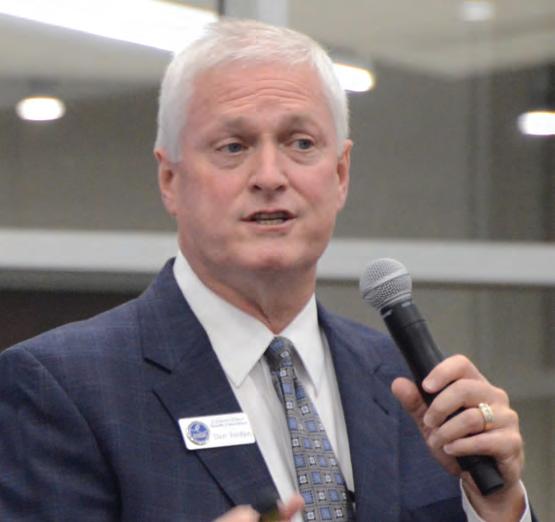
pay. In addition to serving meals, schools also can’t take other steps to encourage payment that are targeted directly at the student, such as serving a different meal, requiring students to wear a wristband or have their hand stamped, or making them sit in a different location. While schools may still contact parents who owe for lunches and request that they apply for meal benefits in a federal or state child nutrition program, they can’t require them to do so.
Legislators were trying to stop the practice of “lunch shaming,” and schools don’t want any student to go hungry. But some school officials had feared the law would remove all incentives for parents to pay for meals or to apply for lunch benefits, and those fears appear to be materializing. Dr. Greg Murry, Conway’s superintendent, said his district had $30,000 in unpaid lunch charges during the first quarter, with some families owing $150. Those unpaid bills must be paid from general operating funds.
Educators voiced other concerns. Act 1029 requires districts to have a bullying and cyberbullying prevention policy, procedures and a professional development program. School board members must be trained at least once in bullying, and ASBA is providing training at education co-ops and in breakout sessions at this year’s Annual Conference. But Bryant Superintendent Dr. Karen Walters said the law is too prescriptive, requiring administrators to complete lengthy investigations and produce written reports to parents over incidents that could have been handled informally and efficiently. (For more, see page 31.) Also, Walters said Bryant’s English language learners funding falls far short of its costs. The district received $215,000 in federal and state funding but spent $1.4 million on salaries and benefits for ELL staff and translating expenses. Greenbrier Superintendent Scott Spainhour said safety remains the state’s biggest unfunded mandate. It’s not in the funding matrix, but it should be.
Jordan gave attendees an overview of laws passed during this year’s 92nd General Assembly. He said it was a successful session. Many legislators supported schools and should be thanked.
Among the laws passed, Act 629 lets school districts establish institutional law enforcement officers who have the same authority as student resource officers. School districts have sole authority over the officers but are also liable for their actions. Act 323 allows school boards to implement pre-employment drug screenings for job applicants and random drug screenings for current employees. Jordan said districts should consult with their attorneys before implementing such policies because Arkansas Attorney General Leslie Rutledge has recently said courts have not ruled on whether teachers and most other district staff members meet the U.S. Supreme Court’s eligibility requirement for “suspicionless” drug testing. (See page 31.) Act 430 requires school districts to allow private and homeschooled students to enroll in academic courses. Districts will receive one-sixth of foundation funding for every course those students attend.
School board members are personally affected by several new laws. Act 1028 requires all public meetings – but not executive sessions – to be recorded with at least an audio recorder. Recordings of open public meetings must be maintained for at least one year. Act 545 moved school elections during presidential election years to the first Tuesday after the first Monday in March, when other primary elections now will be held each presidential year. School districts can still choose to have their elections in November. In nonpresidential election years, school elections will be in May or November.
Act 657 requires property owners to pay real and personal property taxes while an appeal is pending, rather than allowing them to delay payment until the appeal’s completion.
In a related issue, ASBA is monitoring Walmart’s legal efforts to reduce its property taxes by using the “dark store theory.” The idea is that big box retail stores should be valued for property tax purposes as if they are vacant and available for sale or rent, rather than as functioning stores. Walmart has challenged property taxes paid on its 10 Pulaski County locations. Under the dark store theory, its 2018 appraisal in that county would drop from $145 million to $74.3 million.
On Aug. 14, 2019, Pulaski County Judge Barry Hyde denied Walmart’s appeal, but Walmart has appealed that decision in circuit court, and the case could eventually go to the Arkansas Supreme Court. Jordan asked participants to consider how the case could affect local school districts and the state.
Participants in regional meetings also heard from Arkansas Department of Education officials about ADE’s school accountability efforts and its attempts to transform schools into high-reliability organizations.
Mike Hernandez, ADE’s Arkansas state superintendent for the Office of Coordinated Support and Service, spoke at the Region 8 meeting in Bryant. He said the state’s school accountability and reporting measures provide a rear-view mirror look at school performance – in other words, what we
already know. School rating letter grades were released Oct. 9, while school report cards will be released in the first part of 2020 and provide a more comprehensive look.
Meanwhile, the department is pushing the idea that schools should become high reliability organizations that pursue error-free performance.
The concept is based on two books, “Leading a High Reliability School” and “A Handbook for High Reliability Schools” by Robert Marzano, Phil Warrick and other authors. ADE last year distributed those books to school administrators.
Hernandez described schools as having five levels that aren’t exactly hierarchical but do build on each other. At Level 1, schools provide a safe, supportive and collaborative environment. Level 2 schools have effective teaching in every classroom. Those schools communicate a clear vision regarding instruction and provide teachers with clear, ongoing evaluations based on data. Level 3 schools have a guaranteed and viable curriculum. Level 4 schools have standards-referenced student progress reporting. Finally, Level 5 schools are marked by competency-based education.


An Interview With Melissa Walsh, Associate Banker With Stephens Public Finance
The backgrounds of those on the Stephens Public Finance team are as diverse and enriching as the Arkansas School Districts the firm calls partners. Their experience in government, finance, school administration and even the classroom gives Stephens a full-circle perspective to work effectively with Arkansas public schools.
Associate Banker Melissa Walsh brings her experience with Teach for America, both as an educator and later an organization leader, to her current role advising Northwest Arkansas school districts. Helping put students on a path for academic success and helping put Arkansas public school districts on a path for financial success go hand in hand with Walsh’s passion for education. And both make a positive impact on the state Stephens calls home.
How did you get started working in public education in Arkansas?
I have been in Arkansas for eight years now. I came to Pine Bluff through Teach for America, which is a national organization that recruits recent college graduates to serve two years in underserved public school districts. I grew up in Washington, D.C., by way of New York, and I moved to Pine Bluff about 24 hours after I received my college diploma. During my two-year commitment, I taught math for the Pine Bluff School District and was able to explore all parts of Arkansas. I met my now-husband at a Razorback football game, and we just welcomed our daughter into the world a little less than a year ago. To say I fell in love with this state, its people and its potential would be an understatement.
What did you learn about public education in Arkansas during your time with Teach for America?
At the time, Teach for America had more than 250 teachers across 30 communities in the state. I got to know a lot of rural Arkansas through that network of educators. They are a group of people that really cares about public schools and helping students have an equitable education. I came to really see what potential so many of our communities have.
Public schools are the way to unleash that potential in our students and our communities. Arkansas is so diverse in that way. I spend a lot of my time in Northwest Arkansas, which is growing like crazy and has different assets and challenges compared to the communities of the Delta and Central Arkansas. Each district has very different needs. It has been great to be able to work with those diverse sets of challenges and opportunities by being a partner to these districts here at Stephens.
How did you come to work in public finance after spending time in the classroom?
Initially, our Teach For America region included both Arkansas and Mississippi, but in my second year in the classroom, they split, and Arkansas became its own region. That presented an excellent opportunity to be part of a startup that had a ton of institutional memory and history with these communities. I transitioned out of the classroom to support our recruitment, our placement process, and our development strategy. I worked directly with the Executive Director across those 30 communities to better help our teachers and the organization’s efforts. I was out of the classroom, and I got to see a whole other side of the system. I was working mainly with superintendents and saw how the financing of our public schools works, along with its challenges. As a math teacher and math nerd, I found it very interesting and saw firsthand how important that piece of the puzzle is. I also noticed the honest work Stephens was doing to help on the infrastructure side, and I saw how genuinely the firm and its bankers care about ensuring Arkansas public school districts stay financially sound. It’s great to work for a great partner to Arkansas schools.
Where do you get your passion for public education?
I always thought Teach for America was an incredible organization. I remember I was as young as seventh grade, a young woman who had graduated from my high school came back and talked about why she joined Teach for America. That planted the seed for me. I come from a family of several educators – from a theater teacher, to college professors, to dyslexia specialists. I saw so many adults in my family work in education and instill the value of it in me. Moving to Arkansas and working with our schools only enhanced that passion for me. My students in Pine Bluff were incredible. And they deserve a world-class education. I enjoy


working for a company that feels the same sense of conviction I do.
How does having a teacher’s perspective shape your approach to public education financing?
I think it is incredibly important that anyone who works with public schools keeps the students’ interests at the heart of what they do, regardless of how direct or indirect your work with them is. Kids are our most valuable natural resource. I came to the education sector to create change for kids. At Stephens, I have found a marriage between working with schools and putting students first along with my interest in finance. It has been great, and I feel fortunate to do what I do.
What kind of practical experience did you gain in the classroom that applies to your work today?
When I was teaching, I taught algebra to eighth and ninth graders. I have yet to meet a person that says algebra was their favorite subject or that eighth and ninth grade were their favorite years. It was a tough sell. As a result, however, I think I have a unique ability to convey seemingly complicated information to a wide variety of people and make sure they understand it. A major priority of our work is making sure our district partners, superintendents, and school board members alike understand school finance. We want to ensure everyone feels comfortable with the information so they can be better stewards of their school district finances. That classroom experience has uniquely positioned me to make sure we do that well.
What is Stephens Public Finance’s philosophy toward Arkansas public education?
We see ourselves as being a tailwind and not a headwind for our districts. We believe that the better our public school system is, the better our state is. One thing I love about Stephens is the sense of partnership we have with districts. It is a client-first mentality, and that attitude permeates every decision made.
What do you do in your role at Stephens Public Finance?
Stephens represents roughly half the public school districts in the state. I serve as a municipal advisor to primarily
Northwest Arkansas districts, along with the banker in our Fayetteville office, Kevin Faught. Essentially, we advise them on the issuance of debt. Additionally, we provide school board training, unique informational reports, updated reports on legislative actions and much more.
What do you cover in training for school boards?
Every school board member is required to get a certain number of hours of training each year, and Stephens is an approved purveyor for that training. In that training, we cover everything from how schools are funded, different sources of funding, various funding mechanisms, and school-specific financial data. It is essentially a deep dive into how the school finance machine works. Where does your money come from? How much do you get? What are the things that can affect it, and what can you do with it? We provide this free of charge annually to our school board members and go directly to the district. It matters to us that our board members have this knowledge because when they understand it well, everybody wins.
You began your Arkansas public education work in the Delta but now cover Northwest Arkansas? How do public education challenges in those areas differ?
Many districts in Northwest Arkansas are trying to keep up with the growth and are experiencing growing pains. We work to help them figure out how to plan for that growth in a smart way. It has been interesting to get to know that part of the state better and learn what their needs are and how we can best support them.

Melissa Walsh
Associate
Banker (501) 377-2428
melissa.walsh@stephens.com
Lookadoo wanted to coach basketball but found he loved teaching algebra more
By Steve Brawner Editor
In basketball, the point guard distributes the ball so others can excel, so it’s not really surprising that next year’s Arkansas Teacher of the Year played that position in high school not very many years ago.
“I view each class as its own little team,” said Joel Lookadoo, 29, of the Springdale School District. “And so how do we accomplish our goals, and we have to have that common vision. …
“With basketball, everyone has the same goal and they want to be there, so how can we inspire that same thing in a classroom? How can I get students to show up in my classroom excited to be there, wanting to show up, not wanting to miss a day because we don’t know what’s going to happen today? We’re going to have something that’s a fun thing, and I want to be there.”
Lookadoo was announced as Teacher of the Year in an assembly Oct. 22 at Springdale’s Lakeside Junior High School, where he spent his first six years in education as an Algebra I teacher. This year, he became an instructional facilitator at the Don Tyson School of Innovation for grades 6-12.
He knew he was one of four semifinalists but did not know he’d won the award until he walked into what he’d been told was an academic pep rally and saw the various people in attendance, along with the cameras that would be pointed at him. Education Secretary Johnny Key announced him as the award winner.
In the classroom, Lookadoo encourages students to teach each other. He’ll break up a class into small groups led by students who understand a concept. Letting students teach empowers them and helps them further their knowledge, and the small groups provide all the students with valuable feedback. His students analyze ninth-graders’ individual test scores (with names removed) to look

JOEL LOOKADOO was named Arkansas Teacher of the Year during a surprise school assembly Oct. 22. He taught six years at Lakeside Junior High School and now is an instructional facilitator at the Don Tyson School of Innovation.
for associations such as whether band participation is correlated with higher math achievement. (It is.)
Lookadoo’s Beyond program offers college prep help for aspiring students, most of whom would be the first generation in their family to attend college. Students meet twice a month for help
with college admissions, scholarships, and ACT test preparation work. The group occasionally visits a college.
Lookadoo created the program with his wife, former elementary teacher Chantelle Lookadoo, who now raises their two young children full time, and Lakeside teacher Chris Harmon.
His message as Teacher of the Year will be that all students can learn at high levels, that teachers set the expectation for classroom achievement, and that expectations shouldn’t be lowered for students based on their backgrounds. He spent his years at Lakeside teaching a population where 84% are considered low-income students and 42% are English learners. To reach those English learners, he incorporated structured talk routines where students answered questions through a timed process using specific words.
“Most people would look at this school and say, ‘Are you going to be able to really teach to a high level?’ And I say yes, we absolutely can,” he said.
Lookadoo’s term as Teacher of the Year begins July 1, 2020. He will travel the state representing teachers. He received a $14,000 award funded by the Walton Family Foundation after earlier receiving $2,000 when named a semifinalist.
The other semifinalists were Melissa Spence, a first grade teacher in the Conway School District; Jeffrey Whitlow, a fifth grade teacher in the Little Rock School District; and Catherine Beckham, a grades 10-12 teacher of Orientation to Teaching I and II and Senior Internship program leader in the Mountain Home School District.
In his new job as a facilitator, he works with teachers and helps design lessons in addition to teaching one class
period, which means he’s advising and training teachers with more experience than he has. He’ll have that same role as Teacher of the Year. He approaches both from the standpoint that he’s learning just as others are.
“I recognize that yes, I am young and keeping a growth mindset for myself that I can grow, I can get better,” he said. “I want to learn from other people. Constantly every day, I learn something from somebody else, and I think keeping that mindset helps that.”
Lookadoo will be a nonvoting member of the Arkansas State Board of Education, which is currently embroiled in the ongoing controversy over how to release the Little Rock School District from state control. The board voted in October to allow Little Rock to elect its own school board in November 2020, but the state will still be involved in the district.
The issue will still be making headlines when Lookadoo takes his place on the board. He offered a conciliatory response when asked about it.
“That’s a tough situation,” he said. “I think it really is tricky. I think at the heart of it, does everyone want students to succeed? And I think yes. I really believe that. ... We see it in politics, we see it just daily in social media that people don’t always want to hear the other side, and so I think we have to be willing to work together if we’re going to accomplish anything. It’s just like we tell
students in our classes. We say we’ve got to collaborate. We have to learn to work together. And it’s the same thing in Little Rock.”
Classroom teaching wasn’t really Lookadoo’s emphasis when he came to Springdale. A Rogers native, he started four years at point guard at Shiloh Christian School and enrolled at the University of Central Arkansas planning on being a basketball coach. He majored in math education because he would have to teach in order to coach. He later earned a Master of Science in Education in Educational Leadership degree from Arkansas State University in Jonesboro.
When he graduated from UCA, he was hired for his first job at Lakeside as head eighth grade coach, assistant ninth grade coach, and Algebra I teacher. By his second year, he realized he was enjoying the teaching more. There really wasn’t time to do both well. He coached one more year and then focused on Algebra I full time.
For Lookadoo, teaching occurs on many levels. The math lessons help students solve problems, analyze situations, find solutions, and then communicate them.
“And then also, it’s always to me been more than just content,” he said.”The relationships you get to build with students is the best part of teaching, and getting to really know them on a personal level and not just how their math ability is.”
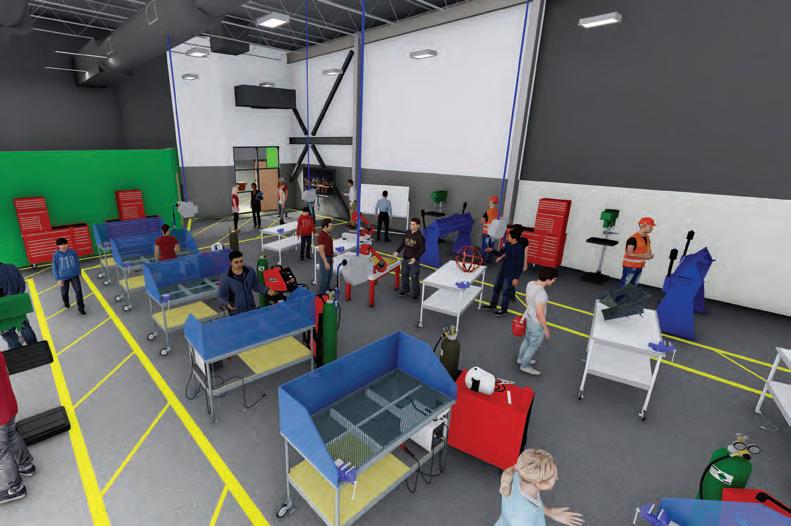

Some say it’s an epidemic, but schools are fighting back through education and enforcement
By Steve Brawner Editor
“We’re losing this fight within the schools. And guys, this is not kids of poverty. This is all kids, it’s very popular, and we have lost control in trying to discipline this out of the schools.”
That’s what Dr. Debbie Jones, Bentonville superintendent, told legislators Sept. 9 after seeing vaping reach what she called “epidemic proportions within the schools.” Tobacco-related infractions at Bentonville climbed from 55 in 2016 to 68 in 2017 and then more than doubled to 146 in 2018. Then they almost doubled again to 287 in 2019. Almost all of that was vaping-related. In fact, D.J. Jones, Bentonville West High School’s dean of students, told Report Card Oct. 25 that he had seen only one cigaretterelated incident in the last 10 months.
Dr. Jones, who is married to Dean Jones, became more aware of the problem’s severity partly because of her husband’s daily experiences combating it.
“I knew it was a real problem when he came home every day and said we’ve got this many kids vaping,” she said.
Teen vaping is a statewide – indeed, a nationwide – problem. On Sept. 9, Dr. Joe Thompson, director of the Arkansas Center for Health Improvement, told lawmakers that 44 percent of Arkansas high school seniors say they have used vape products at some point, and 20 percent use them on a regular basis. In September, the National Institutes of Health announced that teen vaping rates have doubled in the past two years. One in four high school seniors said they had used a vaping product in the last month. Dr. Pebbles Fagan, director of the Center for the Study of Tobacco at the UAMS Fay W. Boozman College of Public Health, told state lawmakers Sept. 18 that adult use of vaping products hasn’t changed much. In Arkansas, less than 6% of adults use the products, while less than 4% of adults nationally are doing

NOT IN OUR SCHOOL. Vaping was not seen as a huge issue in the Mountain View School District until this year, said Superintendent Brent Howard, right. After seeing more incidents – often based on reports from nonvaping students – he and Keenan Glenn, the district’s police chief, have stepped up their enforcement efforts and are installing vaping detectors in some bathrooms.
so. Instead, the industry’s growth is occurring primarily among young people.
The issue has attracted the attention of lawmakers and regulators. President Donald Trump announced Sept. 11 that his administration would ban all
flavored vaping products but now is considering other measures. Some state legislators are proposing laws, but action probably will wait until 2021.
That means it’s up to schools to combat the epidemic for now.
Bentonville has responded with a variety of educational and punitive actions. The district sent a letter to parents when the school year started. School resource officers and other educators have done presentations, and the issue was discussed during a couple of Facebook Live posts. Football players were warned of the damage they could do to their lungs if they vaped. Teachers have become more proactive in checking out the bathrooms. Some students have approached educators saying they need help because they can’t stop vaping, so the school provides counseling services.
Schools are engaged in a cat-andmouse game with vaping manufacturers, who are disguising their products to look like computer flash drives, automatic pencils with lead containers, smartwatches and other items. Dean Jones rarely sees the bigger vaping tanks with digital readouts that were more common at the beginning of the epidemic. Moreover, vaping is more easily hidden than cigarette use. One vaping student was blowing the mist into a fast food cup in class when the teacher turned her back. A nearby student recorded the incident and then alerted authorities. Dr. Jones said when the products were displayed during a staff development exercise, teachers realized how badly they’d been fooled. She said it was “shocking to see how uninformed we all were.”
As for punishments, the district has toughened its policies. Students caught
with a vape face three days of in-school suspension for the first offense, then five days for the next one, then three days of out of school suspension, and then five days. Students are expelled for the fifth infraction. Meanwhile, school resource officers cite students caught vaping, leading to a fine and court date.
Dr. Jones worries about vaping’s long-term health effects. Meanwhile, vaping is resulting in short-term emergencies. A sophomore female student who had never gotten in trouble took a hit from a pen-like device shared by another female. Soon she was unconscious. Two school nurses attended to her and administered sternum rubs but could not revive her. Paramedics administered a nasal Narcan, the product used to revive an individual after an opioid overdose. She was rushed to the emergency room and remained at the hospital several days. She said this was the first time she had ever vaped and that she believed the product contained only nicotine.
As of Nov. 13, the Centers for Disease Control and Prevention was reporting that 2,172 cases had been reported of what it’s calling “e-cigarette, or vaping, product use associated lung injury,” or EVALI, an acute illness that is sending people to the hospital – or the grave. Forty-two deaths have been confirmed. All EVALI patients have used vaping products.
The good news is that EVALI and the publicity surrounding it may be contrib-
uting to a leveling off of the epidemic, at least in Bentonville. As of Oct. 25, the district had seen 58 incidents this year. Dean Jones attributes the slowdown to a growing awareness of vaping’s immediate dangers. Parents are becoming more proactive. The emergency with the sophomore female student shook up many students.
Jones said she carefully chooses what legislation she supports, but she knows exactly what she wants to happen with vaping – restricting advertising aimed at juveniles, eliminating all flavorings, and taxing vape products like tobacco products. History has shown that as tobaccorelated products are taxed, juveniles purchase fewer of them because they simply don’t have the money.
Despite that interest, political realities will mean schools may have to wait for governmental action. This year, Arkansas state lawmakers raised the legal age to purchase tobacco and vaping products to 21. But they declined to endorse Senate Bill 571 by Senate President Pro Tempore Jim Hendren, R-Gravette, which would have levied what amounted to a 67% tax rate on e-cigarette products while also increasing taxes on cigarettes. The proceeds would have funded an earned income tax credit, a tax refund for lower-income Arkansans. The bill also would have levied a 20%
Continued on next page

special excise tax at the retail level on cigarettes, or 80 cents a pack. Introduced late in the session when things were beginning to wind down, it narrowly passed the Senate with bipartisan support but died in the House. It then was placed in interim study. Months later, the House and Senate Public Health, Welfare and Labor Committees voted Sept. 18 to adopt an interim study proposal to determine strategies to combat teen vaping. The proposal was submitted by Hendren and Sen. Missy Irvin, R-Mountain View, the committee chair. While the motion to adopt the study did pass, many of the legislators’ seats were empty. That prompted Irvin to remark of vaping interests, “They have a very strong lobbying group that’s on the ground right now, which may be why people aren’t here.”
In September, Hendren introduced the School Safety Act, which would tax vaping products equivalent to the 67% tax currently levied on other tobacco products, prohibit their use in places where cigarettes are already prohibited, and restrict advertising to minors. Revenues would be credited to the Public School Fund for school facility safety and security improvements along with mental health counselors. The bill would add e-cigarettes to the Arkansas Clean Indoor Air Act of 2006, which prohibits smoking indoors in public places. It also would make wholesalers, manufacturers and retailers guilty of a Class A misdemeanor if they distribute e-cigarettes to minors or advertise to them. And it

would ban e-cigarette advertising on outdoor billboards located within 1,000 feet of a public or private school or playground.
Hendren hopes to pass the bill in a special session or during next year’s fiscal session. But Irvin, a strong proponent of legislative action to reduce vaping, said lawmakers are now focused on the 2020 election. That means nothing will happen until the 2021 regular session, though she is confident something will happen then.
Not every superintendent contacted for this story said vaping is a serious problem in their district. Prescott’s Robert Poole said vaping hasn’t been widespread on campus there. Heath Bennett, superintendent at Harmony Grove in Saline County, said vaping seems to be less prevalent there than at nearby schools. Jon Collins, West Memphis superintendent, said he knows other districts have vaping problems, but he’s not seeing it yet.
“It’s 10 till 2 on a Monday afternoon,” he said. “It may crash at 2 o’clock, and the wave may hit us so hard that we have to wake up tomorrow and figure something out. But (for) our principals, that’s just not been an issue that’s really been overburdening in their day.”
Other districts have decided they have no choice but to tackle the problem. Mountain Home has one of the state’s most aggressive mental health programs, which it is using to address the vaping epidemic. Anyone caught with a vaping product spends five counseling sessions with Matt Sutton, a school-based mental health coordinator. Students also must spend three hours on a Saturday morning in a tobacco education program.
Sutton said students inevitably give two reasons for their use of the product: It’s a quick-fix stress reliever, and peer pressure. A survey of eighth graders found 80% of them saying they were stressed. This past year, Sutton helped start an initiative at the junior high to teach healthy coping skills.


“We’re just in a situation where we’ve got to try to do something because ‘nothing’ is not working for us,” Sutton told lawmakers.
Sutton said the epidemic affects students from every socioeconomic class, including influential families and students with good academic records. One family’s child was caught at school, and the parents realized the student was vaping at home. They thought the smell was some kind of perfume or body spray. He said there are five vape stores in the community, “and the parking lot’s always full, and I don’t think it’s adults there.”
Vilonia School District started working with local law enforcement
this year. Police started issuing citations Sept. 17. Violations are punishable by fines of $10 to $100.
Superintendent David Stephens said the policy sends a message that vaping is not just a health issue, but it’s also a legal one.
“We put it on social media: ‘Hey, y’all need to be aware of this. If anything’s found, not only will there be school consequences, but the Vilonia Police Department will be issuing citations that will be forwarded to the prosecuting attorney,’” he said. “We just made a very intentional effort of giving people that heads up that we’re taking this very seriously, and it’s been received pretty favorably. … We’ve not had, to my knowledge, any pushback.”
Stephens believes the growth in vaping has leveled off, though vaping hasn’t decreased. He believes parents and the community are better educated about the epidemic this year than they were last year. The district is discussing the issue in health classes and in presentations and through social media, but students often don’t appreciate the risks they are taking.
“We actually had a student in the office at the high school that was caught with a device,” he said. “The assistant principal said, ‘Where did you get this?’ And they just said, ‘From some guy.’ They didn’t even know who it was. And so our response was, ‘Then you don’t even know what’s in this that you’re vaping.’ And … the kid was like, ‘Yeah, you’re right. I don’t.’”
The Mountain View School District this year formed its own police department with two officers at its Mountain View campus and one apiece at its Rural Special and Timbo campuses. Those officers are directly involved in enforcing anti-vaping policies. The first offense receives only an in-school suspension, but the second results in a juvenile citation for the purchase or possession of a vaping device. The day before the visit by Report Card, a student had been sentenced to eight hours of community service by a juvenile judge, with the next offense expected to result in a $100 fine.
Superintendent Brent Howard wasn’t seeing vaping as a major problem until
this year, when he and campus police noticed what appeared to be a dramatic uptick in students using the products. This year, more and more students are approaching teachers, administrators and police officials to report on their fellow students, their motivation apparently being to keep it out of the school and to help their classmates avoid the harmful products. Some are living up to higher standards inspired by their memberships in clubs and organizations.
Most of the use appears to be occurring in the bathrooms at lunch and between classes. Howard said educators have been instructed to walk through restrooms occasionally. Meanwhile, the district purchased five vaping detectors at $1,000 apiece that it’s installing in the most heavily trafficked bathrooms. The devices send an alert to administrators’ and law enforcers’ apps when they detect a vaping incident and are so sensitive that they responded when a district official tested them with only a mist. The devices are silent except when someone tries to tamper with them, and then they sound an alarm.
“I know a thousand dollars sounds like a lot, but in the grand scheme of things, I’m here to protect kids any way I can, and that’s a small price to pay,” Howard said.
Mountain View installed the detectors after talking to other districts about them, including Southside in Independence County. The Southside Charter High School installed four detectors in bathrooms at the beginning of the school year.
Like other districts, Southside was dealing with a growing problem. One student spent days at Arkansas Children’s Hospital around the beginning of the school year after vaping during the summer. She now must stop and rest while walking from her car to her classroom. She was forced to quit band because of her diminished lung capacity, though she appears to be healing enough to possibly return to that activity. She has talked with Principal Roger Ried about presenting her story to students.
Ried said the detectors alerted school officials to students vaping four or five times in their first seven days of full operation. Those students were caught and disciplined. Students were surprised at how sensitive the devices were. Soon, they mostly stopped vaping in the bathrooms, but more were caught on camera vaping as they transferred buildings between classes. Between the detectors and the cameras, he believes fewer students are vaping at school. He hopes fewer will become addicted as a result.


By Steve Brawner Editor
Mark Curry is in the risk business.
The Lake Hamilton School Board member and ASBA Region 10 director owns Arkansas Best Insurance, a statewide agency serving businesses and individuals. He’s sold insurance for 23 years and is beginning his 19th year on the Lake Hamilton School Board.
Curry, 58, tries to step back when insurance issues arise during board meetings in order to avoid the appearance of a conflict of interest. But his life experiences give him a special perspective on risk management.
Long before other districts considered such a step, Lake Hamilton enacted a policy of giving staff members access to stored weapons to defend the school against an armed attacker. Last year, then-U.S. Attorney General Jeff Sessions participated in panel discussions at the school where he quizzed personnel about the policy.
Report Card sat down with Curry in the district’s boardroom Oct. 29 to talk about that policy and about how schools can better manage risk.
When did you first run for office?
“That would have been in the year 2000 because I just began my 19th year. … I felt like I had some traits, some good leadership traits. I’m very good at backing up and letting the people that we pay to do a job, let them do their job and we sit back and kind of oversee and provide policy for direction. And I think I’m good at that and good at helping provide some direction.”

Did you ever think you would serve close to 20 years?
“I really didn’t. I ran for the first term, and they’re five-year terms. I ran for the first term, and then I thought,
‘Oh, I like doing this.’ Because honestly, it took me two years or maybe into the third year to feel like I knew what I was doing. So I ran for another five-year term, and then it just kind of gets in your
blood. I like to help, love the school and love the community, and so yeah, I’ll be finishing up 20 years pretty soon.”
What’s been the best part about serving this long?
“One of the best parts for me is sitting there on the stage watching the students come by and knowing that they’ve completed their (education), gotten their high school diploma. … They’re graduating and they’re either going to college or they’re going to work, and I just enjoy that night when they’re graduating and I see the satisfaction on their face for something they’ve completed.”
I guess insurance comes up in school board meetings. Is that your time to really shine?
“Well, actually I try to be careful with that because I don’t want anyone to have a perception that I’m running that part of the school, but I’m always happy to back up and look at different insurance issues and help out with that. But I do try to be careful with that. I never want to create a perception that I’m getting something out of it when I’m really not.”
What can school districts do to save money on insurance?
“School districts can do a better job managing their risk … if they have bus driver safety meetings on what to do and what not to do. You can manage risk by just having employees understand the correct way to lift boxes, the correct way to lift anything, and that helps manage the risk instead of paying out money in worker’s compensation claims. You’re more apt to make good decisions, and you manage that risk instead of paying out more money in insurance. Really, the same thing goes for the property, the buildings and everything. You just keep things up to date, and you keep the electrical codes up to date. And we’re out in the county here, so some of the city codes and things don’t apply to us, but you really have to manage that risk.”
What’s the lowest hanging fruit? If schools did this easy, cheap thing, they would save the most money.
“Worker’s compensation is something that, when a worker gets hurt whatever they’re doing, if they get injured on the job, it’s very costly. … Sometimes if someone is injured on the job, they could be injured and receive disability from the worker’s compensation insurance for a few months or in some cases even a lifetime. So the better job you do in managing a person’s job and making sure that they’re following the proper lifting and safety standards, you’re just a lot better off. And I think that’s one of the biggest areas you can save money.”
What have been some of your more interesting worker’s compensation claims in the past few years?

“I had a customer who is in construction, and they were moving a big I-beam with a crane to put on a school building that they were building. As they were spinning the I-beam around, someone back behind them on the street began to slowly come by, and the I-beam was swinging and hit the car, and it ended up being kind of a pointing contest on who was at fault and everything. It doesn’t sound like much, but that turned into a really interesting claim, and it happened to involve a school.”
How much of a distraction can a worker’s compensation claim be for a school district?
“Not only do you have the distraction of if a person is injured and disabled for a short period of time, but then you’ve got to figure out how they’re going to be able to come back on light duty work. Then there’s the distraction of having to find someone qualified if it happened to be a teacher, and you’ve got to find somebody qualified to come and fill that spot while they’re coming back. It’s even really the same if it’s someone that drives a bus or somebody that does maintenance. You’ve got to have somebody come in and fill in, and that takes everybody’s time to find that person.”
As a school board member, do you have an extra eagle eye for this kind of thing?
Continued on next page
Every child or student has a right to an environmentally safe and healthy learning environment. School districts should not bear the financial burden of construction defects. Trammell Piazza represents a number of commercial clients and governmental entities regarding construction claims. We will arrange for a free expert evaluation and assessment of your building. We are an experienced contingent fee firm willing to share in the risk with you. There is no financial commitment for the school district unless a recovery is obtained on your behalf.
M. CHAD TRAMMELL
IN HISTORIC DOWNTOWN TEXARKANA 418 N. STATE LINE AVE., TEXARKANA, AR 71854 OFFICE: 870-779-1860
MELODY H. PIAZZA IN THE HEIGHTS OF LITTLE ROCK, THE PROSPECT BUILDING
1501 N. UNIVERSITY, STE. 350, LITTLE ROCK, AR 72207 OFFICE: 501-371-9903
AV Peer Review Rated 5.0 / 5.0 Martindale-Hubbell
“I think I do. Yeah, I tend to look at things like that differently than the rest of the board, I can tell. We all do that. Whatever your expertise in work and life is, you apply those skills to your board service. But yeah … whether it’s a claim on a building, or I hear about someone hurt on the job, I’m interested to know the details of how that all happened and think through, what could you have done or what kind of procedure could you have had in place to prevent that?”
In school board meetings, do you ask that question?
“I do. Sometimes it’s not in a board meeting, but I’ll talk to the superintendent about what’s going on with this, and what are you going to do to help prevent it from happening next time, or just what happened? And sometimes it’s something that’s in no way avoidable. It’s an accident.”
Running for school board is a risk. You might lose. So I’m wondering, what is your general attitude toward risk?
“Being on the school board could be a risk professionally and personally. And I think you just have to, in your mind, you have to manage that. I hate to keep using that same word (manage), but you just have to, when someone calls with a problem, you just have to listen and make sure they follow the proper channels. That’s probably it.”
I know you don’t want to use the word “manage,” but I think it’s a fine word. You’re not about avoiding risk. You’re about managing risk. Is that kind of your general attitude?
“I think it is for me. You manage your potential risk in whatever you’re doing. I’m going to manage and analyze my risk when I get in my vehicle outside.”
What makes Lake Hamilton unique as a school district?
“Yeah. I like that. We have four mottos: academics, atmosphere, athletics and the arts. We just really think that we excel in all four of those areas. … I’m so very proud of what we’re doing academically because in years past Lake
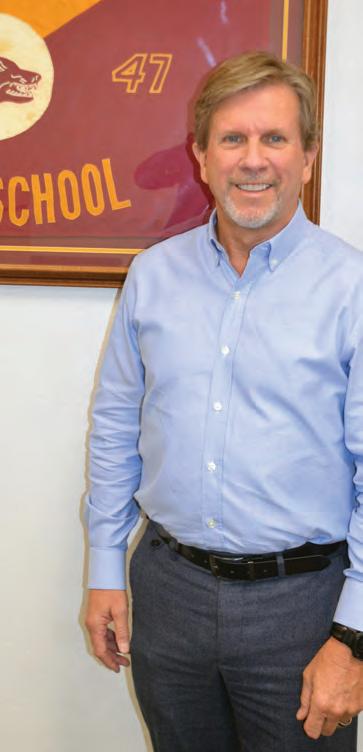
Hamilton was always known as the athletic school. You know, that’s the athletic school in the county, and I’m really happy to say that I think we’ve overcome some of that perception, and we’re very strong academically. Our atmosphere we think is still like a little country school. Even though we have around 4,500 students, it’s impressive to watch each of the building principals and the staff there and how they make it just their little community school. They do a great job with that.
“Then in the arts, our band program is maybe one of the top ones in the state. They’re planning a big trip to London right now to be able to march in a parade there, and (we’re) proud of them. We always see some of our artists with art on display in the State Capitol with different awards that they’ve won. And I’m going to leave somebody out talking about the arts.”
It’s a risk.
“Yeah, it’s a risk! The choir program does great. I know we have a lot going on there. And then in athletics, we
Whether it’s a claim on a building, or I hear about someone hurt on the job, I’m interested to know the details of how that all happened and think through, what could you have done or what kind of procedure could you have had in place to prevent that? “ ”
always do well. We have, every year, several teams that either finish in the top or win their classification. And it’s interesting now as we have – and maybe I’m not going to get the terminology right – the e-sports – that are now recognized by the AAA, and it’s fun to see what they’re doing and what they’re competing with and such now. But I’m really proud of those four areas.”
What’s different about Lake Hamilton as far as its geographic situation?
“Well geographically, we don’t have a town, so we’re over here in the west part of the county. It’s just us. A unique thing is that we have a pretty large traffic jam between about 7 and 8 every morning, then again every afternoon from 2:30 to 3:30. We’ve talked about doing something about it, but it’s kind of difficult when it only lasts for a short period of time. Another thing that makes us pretty unique is that we have, I believe, now 66 bus routes every day, so we’re covering a large amount of territory every day that I know a lot of other districts don’t.”
How does not having a town affect you?
“We think it affects us a lot because with seven school districts in our county, when we go ask for support, whether it’s financial support or just support to help us do something, just general support from restaurants or businesses, we’re competing against the other six districts in town. It’s kind of a challenge where if we were the city of Lake Hamilton that would be much different. We have to work hard to make sure people remember that we’re out here because everybody thinks, ‘Oh, it’s a long way out there.’ And it takes about 10 minutes.”
Lake Hamilton is known for its security policies. Tell me about them.
“Well, one of the things that we did way back when after the school shooting and violence in Colorado is we talked to some of those people. I was at a meeting, was talking with some of those folks from Colorado, and I said, ‘So what are you doing? What are you going to do differently?’ And the first thing out of the gentleman’s mouth was, ‘We’re going to pray harder. And we believe that whatever you do is still not a hundred percent.’
“You bring that back home and you kind of put feet to that, and you start looking at what you’re doing with your school security and you look at all the gaps that you find in school security. Just little things like the procedure for allowing a visitor to come into a building, you realize, wow, there’s a lot of areas there where we don’t feel all that secure. And at some point along that process, we had someone come in and evaluate what we’re doing. And now we have the same procedures for getting into every building, and we’ve reworked several of the entrances to make that a more secure situation so that we know who’s coming in before they actually get in. We have a school resource officer now who’s a deputy with our Garland County sheriff’s department. There are a few of our staff that (have access to) weapons on the campus. I say a few because as a board member, we’ve on purpose stayed away. I don’t know if it’s two or if it’s six. Nor do I know who they are. I don’t know what building they’re in. But we have that in place, and we’re constantly looking at ways to do a better job with that. … During the day, some of the exit doors have electronic timers on them so that they’re locked during class and unlocked for a five-minute period when students need to go from one building to the other. We’ve even looked at walking through metal detectors in the morning, and it’s just really not feasible to do so, but you just do all you can and work towards fine-tuning and making it better.”
What you’re describing sounds exactly like someone who’s really into risk management, coming up with
what works and what’s worth it. Is that part of the whole process?
“Yeah, you have to think through and … manage the risk. You think about, how much more secure would it be to have every student walk though a metal detector in the morning? I like the security that would provide, but then you think about how it really would work in real life. The first student would have to walk through the metal detector at 6 a.m., and it’s not really very practical. So yeah, I think you have to manage and decide what’s feasible and what’s not.”
In general terms, how would you describe your policy for arming staff members?
“First of all, it’s not teachers who have a gun, and they’re not walking around with a weapon on their side. They have a weapon in a secure place that they can get to quickly when and if the need arises.”
You had U.S. Attorney General Jeff Sessions visit a few years ago. Did you guys want to become the national poster child for arming staff members?
“No. (Laughs.) We operate here at Lake Hamilton most of the time with,
‘OK, if there’s something new going on, let’s let somebody else try that first, and then we’ll take advantage when it’s ironed out.’ But that worked differently. We were honored for them to be here. ... I got to sit on that panel the day that they were here, and they seemed to really want to know what we’re doing (that would help them) come up with some policy at a national level.”
I don’t want to put words in your mouth, but I guess it’s really up to each individual school district. What works here may not work at the Hot Springs School District. Is that right?
“Right. Right, yeah. You just have to do what works best for you.”
If a school district is thinking about their school security policies, including potentially making it to where a staff member has access to guns, what advice would you give?
“Do your research and talk to a lot of school districts that are doing it and see the different ways to do it. Make sure you’re staying within your legal authority and listen to your community and ease into it.”
Note: Executive Session is edited for length, style and clarity.




Homeland Safety Systems, Inc. encourages schools to implement emergency preparedness strategies to promote a safe environment for all staff and students.
National School Safety and Security Services suggests three key strategies for emergency preparedness planning. First, school administrators should be trained on school threat assessment, school violence prevention, and school security procedures. Second, adequate security can involve a combination of metal detectors, surveillance cameras, access control, and intrusion alarms. School administrators should get a risk assessment done to assess their individual security needs. Safety is not a one-size-fits-all solution. Third, school administrators should meet regularly with public safety partners to update school emergency plans and exercises.
Homeland emphasizes continuous security assessments, routine meetings and trainings, and system reviews with law enforcement and security providers to maintain an up-to-date security plan.
For more information about Homeland, go to www.homelandsafetysystems.com, or call 888.909.2261.
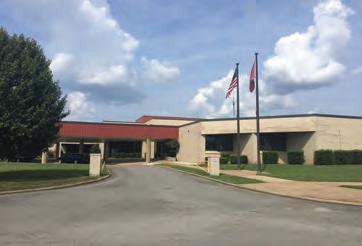
CEDAR RIDGE is one of the districts Entegrity is helping to take advantage of the Solar Access Act.
With the assistance of Entegrity, Cedar Ridge School District, Midland
School District, and Concord Public Schools are among the first schools in the state to take advantage of the Solar Access Act to improve their facilities.
Cedar Ridge and Midland are planning to install a 1.36-megawatt single axis tracking system, and Concord will be installing a 341-kilowatt fixed array. Cedar Ridge and Midland are unique in becoming the state’s first districts to utilize co-located solar energy technology.
For more information about how Entegrity can help school districts save money on energy costs, go to www.entegritypartners.com or call 800.700.1414.
McPherson & Jacobson recently was contracted to help the Riverview, Harrisburg, and Heber Springs School Districts with superintendent searches. Riverview closes Dec. 17, Harrisburg closes Jan. 7, and Heber Springs closes Jan. 8. The lead consultant for all three is Dr. Kieth Williams, who can be reached at k_williams@macnjake.com.
McPherson & Jacobson has been assisting Arkansas school districts with superintendent searches for 20 years. For more information about McPherson & Jacobson, go to www.macnjake.com, or call 888.375.4814.
The Arkansas Arts Academy in Rogers, designed by Hight Jackson Associates, has received the Grand Prize Award for excellence in educational facility design from Learning By Design and was featured in the Fall 2019 Learning By Design magazine.
In addition, Arkansas Arts Academy has been named Citation Winner by American School & University and was featured in the 2019 Fall Architectural Portfolio.

This multi-faceted project included demolition, renovation, and new construction on a compact site in a historic residential neighborhood.
For more information about Hight Jackson, go to www.hjarch.com or call 479.464.4965.

The Omaha School District, along with architects at Modus Studio, have begun designing a FEMA shelter that will serve as a focal point on campus and provide a safe area for the community as well as an indoor archery range and restrooms.
The new 4,000-square-foot structure will be located in the heart of the campus, replacing the existing gym, and will be constructed with precast concrete. Construction is scheduled to begin in the summer of 2020.
For more information, go to modusstudio.com or call 479.455.5577.
The Division of Legislative Audit will release the audited financials for most Arkansas school districts in early 2020. Once released, each district needs to file its audited financials with the federal government within 90 days of receipt in accordance with the district’s continuing disclosure agreement. Districts that receive a financial audit conducted by a private auditor should submit their report within 90 days after approval of the report by the school board. Once the audit is received and/ or approved, Stephens can assist the district in making sure all information is disclosed to the appropriate body.
This requirement is due to the continuing disclosure agreement the district entered into when issuing municipal bonds. Continuing disclosure requirements consist of important information about a municipal security that arises after the initial issuance of the bonds.
If you would like to learn more about how Stephens can assist your district, please contact Melissa Walsh of Stephens Public Finance at 501.377.2428.

Baldwin & Shell constructs large Bryant Junior High
Baldwin & Shell Construction Company recently completed construction on the 252,000 square-foot Bryant Junior High School – the second largest junior high building in the state.
This state-of-the-art facility serves more than 1,600 students and is built to accommodate 2,100 students. It includes
two gymnasiums, media center, blackbox auditorium, band and choir room, cafeteria, 79 classrooms, 29 lab rooms and more. Positioned on a 65-acre campus, the 8th-9th grade school opened its doors for the school year in August 2019.
In addition to the junior high, Baldwin & Shell currently has multiple projects in the Bryant School District including the high school cafeteria, performing arts center, P.E. building, and the soon-to-be constructed Hornets Stadium. With over 450 K-12 projects, Baldwin & Shell continues to be a leader in school construction. In fact, it recently was the Arkansas pick for “Best Middle School and High School Contractors in the U.S.” by GC Magazine.
For more information about Baldwin & Shell, go to baldwinshell.com.
The alliance of C.R. Crawford Construction and NWA Brand has helped another school district pass a millage increase to fund the construction of academic facilities.
For the first time in 20 years, voters in the Prescott School District approved a millage increase, which will be used to construct a new elementary school and install enhanced security systems in existing classroom buildings. Fifty-eight percent approved the 5.9 mill increase.
Services provided by NWA Brand include identifying key issues, organizing campaign meetings and events, campaign branding, and social media strategy development.
For more information, go to crcrawford.com or call 479.251.1161.
WD&D Architects is developing immersive learning spaces to deliver project-based learning for the Springdale School District. The transformative
design approach promotes a shift in the instructional mindset and the physical environment to allow for learning to take place anywhere.
The physical transformation includes visual transparency; flexible furniture that allows multiple types of learning; collaborative spaces for small group work; student presentation areas that facilitate sharing and interacting; maker spaces that are interactive and engaging; and learning commons that support learning, research and socialization.
For more information, visit wddarchitects.com or the firm’s Facebook page, or call 501-376-6681.

Custom millwork combines functionality with design to create a large impact when both space and budget are limited. When a complete renovation or rebuild is not possible, schools often turn to custom millwork solutions to provide both a cosmetic update and organization for highly-trafficked areas, such as check-in areas, storage spaces, and resource centers.
Nabholz’s custom cabinetry team recently transformed a media center in an elementary education client’s library, creating a structure with different elevations for computers, conversation points and desks, as well as storage for cords, office supplies, and more. At the new Arkansas Children’s Hospital in Springdale, Nabholz created unique nurses’ stations for each floor. Each station matched the color theme of its floor, extending the hospital’s cheerful design to even these most functional places.
For more information, go to nabholz. com, or call 877.NABHOLZ.
Premier Partners Contact
AETN - Arkansas Ideas
American Fidelity
Baldwin & Shell Construction Company
BXS Insurance
First Security Beardsley
Homeland Safety Systems, Inc.
Lifetouch National School Studios, Inc.
Pro Benefits Group, Inc.
Stephens Inc.
Bryan Fields
800.488.6689 bfields@aetn.org www.aetn.org
Tom Sledge 800.688.4421 tom.sledge@americanfidelity.com americanfidelity.com
Katie Cooper 501.374.8677 kcooper@baldwinshell.com www.baldwinshell.com
Bill Birch 501.614.1170 bill.birch@bxsi.com www.bxsi.com
Scott Beardsley501.978.6392 scott@fsbeardsley.com fsbeardsley.com
Mike Elliott 318.221.8062 mike@hssems.com www.homelandsafetysystems.com
Patrick Hand 479.631.8951 phand@lifetouch.com schools.lifetouch.com
Gary Kandlbinder501.321.0457 pbfsi@sbcglobal.net www.pbfsi.com
Jason Holsclaw501.377.2474 jason.holsclaw@stephens.com www.stephens.com
The Interlocal Purchasing System (TIPS) Mickey McFatridge870.926.9250 mickey.mcfatridge@tips-usa.com www.tips-usa.com
TRANE Beau Reynolds501.478.2938 beau.reynolds@trane.com www.trane.com
Exhibiting
A.D.E.M. / Federal Surplus Property
ACE Sports
A-Lert Roof Systems
All-Clean USA
Architecture Plus, Inc.
Arkansas Single Parent Scholarship Fund of Pulaski County
C.R. Crawford Construction, LLC
Caddell Construction Co. (DE), LLC
Capital Business Machines, Inc.
Chartwells
Brian Jones 501.835.3111 brian.jones@adem.arkansas.gov www.adem.arkansas.gov
Mark Bridges 501.909.9173 mark.bridges@acesports.com www.acesports.com
Vic Runer 803.626.7755 vruner@centurionind.com www.alertroofsystems.com
Lisa Graham 870.972.7729 lgraham@allcleanusa.com www.allcleanusa.com
Craig Boone 479.783.8395 craig@archplusinc.net archplusinc.net
Keisha Smith 501.301.7773 ksmith@aspsf.org www.aspsf.org
Phil Jones 479.251.1161 pjones@crcrawford.com www.crcrawford.com
Ricky Byrd 479.319.3387 ricky.byrd@caddell.com www.caddell.com
Ben Higgs 501.375.1111 bhiggs@capbiz.com www.capbiz.com
Kellye Neal 501.615.3660 kellye.neal@compass-usa.com www.chartwellsschools.com
Crow Group Morgan Zimmerman479.264.4332 mzimmerman@crowconst.com crowgrp.com
Curtis Stout
David H. Frieze and Associates, Inc.
Davis Rubber Company
EAST Initiative
Edgenuity
Justin Kellar 501.372.2555 jfkellar@chstout.com www.chstout.com
Paul Frieze 501.922.9704 paulfrieze7@gmail.com
Phillip Davis 501.374.1473 davisrubber@icloud.com davisrubbercoinc.com
Lani Jennings-Hall 501.371.5016 lani@EASTstaff.org www.eastinitiative.org
Harry Dickens 501.615.4748 harry.dickens@edgenuity.com www.edgenuity.com
Educational Technology Learning/Edbrix Ed Tweedle 817.310.3900 ed@edtechlearn.com edtechlearn.com
Entegrity Energy Partners
Rick Vance 501.414.0058 rick.vance@entegritypartners.com www.entegritypartners.com
ESS Tammy Winn 870.236.2350 twinn@ess.com ess.com
French Architects
Hight Jackson Associates, PA
Jackson Brown Palculict Architects
Kinco Constructors
KLC Video Security
Lakeshore Learning Materials
LeafFilter North, LLC
Lexia Learning
David French 501.622.0958 david@frencharchitects.net Frencharchitects.net
Liz Cox 479.464.4965 lcox@hjarch.com www.hjarch.com
Randall Palculict501.664.8700 randy@jbparchitects.com www.jbparchitects.com
Clay Gordon 501.255.7606 cgordon@kinco.net
KincoConstructors.com
Bill King 903.792.7262 Billking.klc@gmail.com www.klcvideosecurity.net
Blake Stansbery310.537.8600 bstansbery@lakeshorelearning.com www.lakeshorelearning.com
Tonia Rollins 800.726.7703 trollins@leaffilter.com www.leaffilter.com
Sarah Coleman978.402.3506 scolman@lexialearning.com www.lexialearning.com/ar McPherson & Jacobson, LLC
Midwest Bus Sales, Inc.
Modus Studio
Moser Construction, LLC
Musco Sports Lighting, LLC
Nabholz Construction Company
National Safety Shelters
Palomar Modular Buildings
Performance Surfaces
PI Roofing
Pop Pop Shoppe
R.J. Love Enterprises, Inc.
Reading, Writing, and ... All That Jazz
Shields Security Solutions
Southern Bleacher Company
Strategos International
Tri-State Floors, Inc.
Van Horn Construction, Inc.
Virco, Inc.
WER Architects/Planners
Thomas Jacobson888.375.4814 mail@macnjake.com www.macnjake.com
Tim Toolen 479.474.2433 ttoolen@midwestbussales.com www.midwestbussales.com
Josh Siebert 479.455.5577 josh@modusstudio.com www.modusstudio.com
Robert Moser 501.847.4777 rmoser@moserconstruction.net www.moserconstruction.net
Jeremy Lemons501.249.8056 jeremy.lemons@musco.com www.musco.com
Jake Nabholz 501.505.5126 jake.nabholz@nabholz.com www.nabholz.com
Sara-Jane Corrado 772.248.0236 sara@nationalsafetyshelters.com www.nationalsafetyshelters.com
Jade Pulfer 469.727.0727 jpulfer@palomarmodular.com palomarmodular.com
Ryan McCaslin405.570.0386 rmccaslin@performancesurfaces.com www.performancesurfaces.com
Joel T. Johnson 501.400.6121 joel.johnson@piroofing.com piroofing.com
April Pierce 903.276.5580 april@poppopshoppe.com www.popopfundraising.com
Rick Love 501.988.5474 rlove@rjlove.com www.rjlove.com
Debbie Hardwick-Smith 479.263.0815 Readindeb@cox.net www.heinemann.com
Brent Amaden 501.255.0352 b.amaden@ShieldsSecuritySolutions.com
ShieldsSecuritySolutions.com
Carla Herndon 940.549.0733 herndon@southernbleacher.com www.southernbleacher.com
Regina Ferguson816.204.1243 Regina@strategosintl.com Strategosintl.com
Dean Smith 918.343.2553 dean@tri-statefloors.com www.tri-statefloors.com
Chad Weisler 479.968.2514 cweisler@vanhornconstruction.com www.vanhornconstruction.com
Bruce Joyner 501.908.9461 brucejoyner@virco.com www.virco.com
Eldon Bock 501.374.5300 ebock@werarch.com www.wearch.com
WD&D Architects Glen Woodruff 501.376.6681 gwoodruff@wddarchitects.com www.wddarchitects.com
Central States Bus Sales, Inc.
NE-ARK Adjustment Co.
Mike Wingerter501.955.2577 mikew@centralstatesbus.com www.centralstatesbus.com
Mike Brigance 870.838.0097 neark@swbell.net
Raymond James David Fortenberry501.671.1334 david.fortenberry@raymondjames.com www.raymondjames.com
The Legislature this year passed many acts affecting schools and school boards. Let’s focus on two dealing with employee drug screening and bullying.
Under Act 323, school boards for the first time can develop policies for their districts to implement pre-employment drug screening of job applicants and random drug screening of current employees. Policies can be developed for both licensed and classified personnel. The law specifically provides that districts may discipline employees who test positive, including through termination, temporary leave, or a mandatory drug treatment program.
However, districts should proceed carefully. Attorney General Leslie Rutledge recently wrote an opinion saying Act 323 could be challenged on the grounds of the U.S. Constitution’s prohibition against unreasonable searches and seizures. She believes the act likely would be declared constitutional, but no federal appellate court has ruled whether teachers and other employees can be compelled to submit to “suspicionless” testing. She advises school districts to consult with their local counsel before enacting drug testing policies. That’s good advice.


by Jay Bequette ASBA General Counsel
Meanwhile, Act 1029 requires school boards to adopt policies to prevent bullying and respond when it happens. The policies must clearly define bullying conduct, state the consequences for engaging in it, and require that school employees who witness or have reliable information about bullying report the incident to the principal as soon as possible.
The law mandates a specific set of actions for principals and their designees to take when they receive a credible report or complaint of bullying. Those actions include informing the parent of the student who allegedly was bullied, preparing a written report of the incident, and completing the investigation within five days of the initial report.
Once the investigation is completed, the school may provide intervention services, establish training programs to reduce bullying, discipline any of the
parties involved, notify the parent of the perpetrator of the consequences for continued bullying, and produce a written record of the investigation.
The statute does not define a “credible” complaint, so we would presumably use the colloquial definition, which is “believable” or “convincing.” Bullying can be repeated behavior or one act that meets the statutory definition, which is “intentional harassment, humiliation, intimidation … by a student against another student or school employee … that causes or creates reasonably foreseeable physical harm or damage to property, substantial interference with a student’s education or the employee’s role in education, a hostile educational environment, or substantial disruption in the school’s orderly operation.”
Finally, the number of bullying incidents, and actions taken in response, must be included in a report the superintendent makes each year to the school board regarding discipline in the district.
Drug abuse and bullying are very different problems, and both are serious. Drugs can harm the user and others affected by the user. Bullying harms the victim and, ultimately, also the perpetrator. School districts that follow the law and consult with their attorneys can address these issues, protect students, and stay out of legal trouble.



When Clarksville School District built its new high school, they made sure to include a Career and Technology School. Nabholz helped bring this technical training space to life, constructing areas where students can gain hands-on experience in a variety of skilled trades.